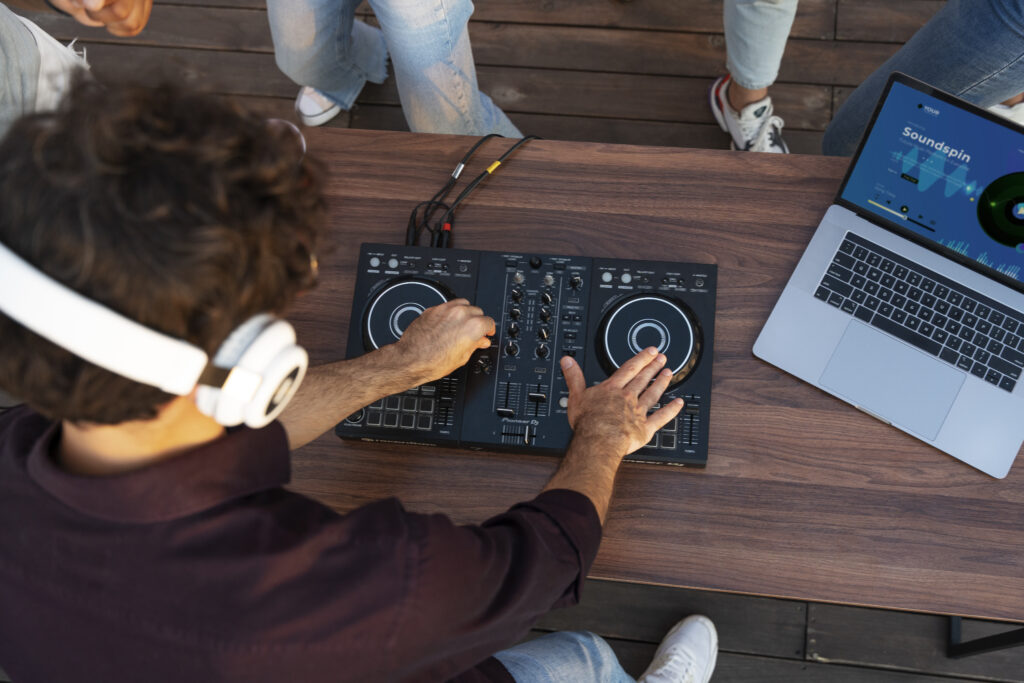Revolutionizing Music Composition: 11 AI Tips
The advent of artificial intelligence in music composition marks a significant paradigm shift, poised to redefine the creative landscape. As composers and musicians access AI-powered tools, the potential for innovation in melodic creation and sound design is unprecedented.
These tools not only offer a plethora of new opportunities for artistic expression but also challenge traditional notions of authorship and creativity. The intelligent application of AI in this field could democratize music creation, allowing both seasoned artists and novices to transcend conventional barriers.
However, this technological revolution also creates a complex tapestry of ethical and practical considerations that must be carefully navigated. As we consider how AI can enhance and alter the compositional process, it is crucial to equip oneself with a nuanced understanding of these tools and their implications.
In the following discourse, we shall outline 11 pivotal tips that aim to empower musicians to harness the full potential of AI while addressing the intricate questions it raises, setting the stage for a discussion that could shape the future of music as we know it.
Key Takeaways
- AI-powered platforms like Boomy, AIVA, and Deep Beat are revolutionizing music composition.
- AI can potentially augment human creativity by generating new ideas and compositions.
- AI democratizes music production, allowing individuals without formal training to create music.
- Collaborating with AI in music composition combines human intuition with machine precision for innovation.
Embracing AI for Creativity

Harnessing the power of artificial intelligence, creative professionals and enthusiasts alike are now turning to AI-driven platforms such as Boomy, AIVA, and Deep Beat to revolutionize the process of music composition and expand their creative horizons. AI in music creation is not just about automating tasks; it’s about augmenting human creativity with tools and software that generate new ideas and create original music compositions.
These platforms catalyze innovation, offering a symbiotic relationship where AI proposes novel melodies and structures while the artist brings their unique perspective and emotional touch.
Integrating AI tools in the creative process can significantly democratize music production, allowing individuals without formal training to explore musical creation. In this analytical approach, it’s essential to understand that AI does not replace the artist; instead, it functions as an assistant that takes on the uphill part of generating numerous possibilities, which the human touch can refine.
The resulting synergy between AI capabilities and human ingenuity can lead to compositions that might have been inconceivable through traditional means, marking a new era where technology and artistry converge to push the boundaries of what’s possible in music.
Selecting the Right AI Tools

The process of choosing AI tools for music composition necessitates a critical assessment of their functional capabilities to ensure they meet the creative and technical demands of the project.
Compatibility with existing systems is paramount; an AI tool must integrate smoothly with current workflows and hardware to facilitate an efficient, creative process.
Furthermore, the learning curve associated with new technology should be considered, as it can significantly impact the time invested in mastering the tool and the overall productivity of the composer.
Evaluate Tool Capabilities
Selecting an AI music composition tool requires thoroughly evaluating its capabilities to ensure it meets the composer’s specific creative and technical demands. When examining AI tools like Boomy, AIVA, Deep Beat, and Prisma, assessing whether their functionalities resonate with your composition needs is crucial.
Evaluate tool capabilities by considering their library of musical resources, efficiency in generating original music, and proficiency in automating repetitive aspects of music production. Analyze each tool’s potential of AI to democratize the composition process, enhance creativity, and foster collaboration.
Scrutinize their capacity to analyze musical datasets, which can create innovative and technically sound compositions, ultimately boosting productivity for musicians and composers alike.
Consider Compatibility Issues
After evaluating the capabilities of various AI music composition tools, it is crucial to consider their compatibility with your existing creative workflow and technological environment. Integrating AI into the music industry facilitates the ability to create original music compositions. However, to efficiently use AI and generate unique content, one must navigate compatibility issues that could hinder the creative process.
| Compatibility Factor | Why It Matters | Considerations |
|---|---|---|
| Software Integration | Ensures seamless workflow | Check plugin support and DAW compatibility |
| Hardware Requirements | Avoids technical constraints | Confirm system specifications and resource needs |
| Scalability | Allows for future growth | Assess the tool’s ability to handle larger projects |
Selecting the right AI tools means ensuring they align with your style, offer flexibility, and are future-proof against evolving technologies.
Assess Learning Curve
Understanding the learning curve associated with AI music composition tools is essential for determining suitability and ensuring a smooth integration into one’s creative process. When selecting the right AI tools, it’s critical to evaluate their technical capabilities, how they match your learning aptitude, and the time and effort required to master them.
- Evaluate the complexity of AI models and their user interfaces.
- Determine the amount and quality of training required for practical use.
- Analyze the time investment needed to create original music compositions.
- Consider the ease of integrating learning algorithms to analyze music data.
- Assess the support for advanced machine learning algorithms facilitating AI in music composition.
These factors collectively influence the practicality and efficiency of incorporating AI into music composition workflows.
Streamlining Composition Workflows

Incorporating AI-powered tools into music composition workflows can significantly reduce the time spent on repetitive tasks, fostering a more efficient and creative environment for composers. AI algorithms can quickly generate new musical ideas, melodies, and harmonies based on user input, thus expediting the traditionally time-consuming process of brainstorming and trial-and-error. As a result, composers can focus on refining their work’s emotional and aesthetic qualities rather than getting bogged down by the mechanics of composition.
Composers can explore new genres and styles by embracing AI to create unique music based on specified parameters. This expanded sonic palette allows an analytical approach to understanding and integrating unfamiliar sounds and structures into compositions. Furthermore, AI’s capacity to generate many ideas can help composers overcome creative blocks, offering continuous inspiration.
Collaboration with AI systems introduces an innovative partnership where the immediacy and diversity of AI-generated content can be harnessed to complement and enhance human creativity. Streamlining workflows with AI accelerates the compositional process and enriches the final product with a blend of precision and innovation that is uniquely possible through this symbiotic relationship.
Experimenting With Ai-Generated Melodies

Experimenting with AI-generated melodies offers composers a profound opportunity to push the boundaries of traditional music creation, fostering an environment where innovation in melody and harmony can flourish. AI Music tools that generate melodies catalyze the creation of music that can be both novel and inspiring. AI-generated music platforms often employ sophisticated algorithms like variational autoencoders to produce many musical ideas, which composers can then fine-tune.
When incorporating AI into the music composition process, consider the following points:
- AI-generated melodies can provide a fresh perspective, breaking through creative blocks by suggesting musical directions that may not have been previously considered.
- Variational autoencoders are particularly adept at capturing and generating complex patterns in music, allowing for rich and intricate melodic structures.
- Experimenting with AI-generated music can lead to unique blends of genres and styles, offering new avenues for musical expression.
- AI tools can help composers explore variations of their themes, leading to a deeper understanding of their musical ideas.
- Collaborating with AI in creating music allows for a symbiotic relationship where human intuition meets machine precision, leading to innovation in musical composition.
Integrating AI Into Collaboration
Integrating AI into musical collaborations can significantly augment the creative process, providing a dynamic flow of ideas and expanding the team’s innovative capacity. These AI systems serve as idea generators and tools for refining and developing musical concepts, enabling a more efficient workflow.
The symbiotic relationship between human musicians and AI can produce innovative compositions reflecting a new music production era.
Enhancing Team Creativity
Leveraging artificial intelligence in team-based music composition can significantly expand creative horizons, offering fresh perspectives and innovative solutions to musical challenges. By integrating AI into the collaborative process, teams can utilize AI algorithms to create original music compositions that blend the human touch with machine precision. This synergy generates new possibilities and elevates the entire creative endeavor.
- AI algorithms suggest novel chord progressions and melodies to spark inspiration.
- Diverse musical styles and genres can be explored effortlessly, enhancing team creativity.
- Democratization of music composition through user-friendly AI tools.
- The fusion of human creativity and AI leads to unique and innovative compositions.
- AI integration redefines collaboration, leveraging social media for broader creative input.
Streamlining Idea Generation
Building on the enhanced team creativity fostered by AI, integrating artificial intelligence into musical collaborations offers a seamless method for rapidly generating innovative ideas. AI in the music industry has become a powerful tool for composers and musicians to quickly develop new motifs and harmonies, significantly boosting the generation of ideas. Using AI, artists can create original music compositions with a novel blend of human intuition and algorithmic innovation.
| Benefit | AI Contribution | Outcome |
|---|---|---|
| Idea Diversification | Generates Unique Variations | Expands Creative Possibilities |
| Efficiency | Quickly Generates Ideas | Reduces Time to Creation |
| Experimentation | Suggests New Combinations | Encourages Genre Exploration |
This table underscores the transformational impact of AI on musical collaboration, highlighting its efficiency and the breadth of experimentation it unlocks.
Exploring New Musical Genres
Delving into diverse musical genres through AI-powered tools can significantly broaden a composer’s creative scope and lead to the emergence of innovative, hybrid musical expressions. The ability to explore new genres and styles with AI enriches the range of music one can produce and propels the creation of new music that defies conventional categorizations.
Utilizing machine learning algorithms, composers can draw inspiration from a vast array of Musical Styles, leading to the development of unique soundscapes. AI’s capacity to analyze and synthesize different genres means composers can create high-quality works that meld various influences into a cohesive whole. Here are key ways AI is changing the exploration of new musical territories:
- Experiment with a broad spectrum of genres to find new sonic possibilities.
- Employ AI to fuse disparate Musical Styles, crafting unique genre-bending compositions.
- Use AI as a tool to democratize the composition process, making genre exploration accessible to all.
- Overcome creative barriers using AI to suggest novel musical ideas in unfamiliar genres.
- Collaborate with AI to push the limits of traditional genres, leading to innovative musical creations.
Fine-Tuning AI Outputs
The efficacy of AI in music composition hinges on selecting the appropriate model that is conducive to the intended artistic expression and technical demands.
Fine-tuning AI outputs is a critical step that involves iterative composition refinement, ensuring the generated music not only resonates with the creator’s stylistic preferences but also adheres to the nuances of the chosen genre.
This process fosters a symbiotic relationship between the composer and AI, where continuous interaction and adjustment lead to progressively more sophisticated and personalized musical pieces.
Selecting the Right Model
Selecting the appropriate model for fine-tuning AI outputs is critical in harnessing artificial intelligence for innovative music composition. In this analytical and concise exploration, we consider the factors crucial in selecting the suitable model:
- Understanding Model Capabilities: Comprehend the strengths and limitations of various AI models.
- Data Analysis Proficiency: Ensure the AI can effectively analyze large datasets for nuanced music creation.
- Creative Flexibility: Choose algorithms that offer adaptability in generating diverse musical styles.
- Enhancement and Modification: Select models capable of refining and modifying compositions for a unique output.
- Ethical and Creative Considerations: Be mindful of the creative control and ethical implications of using AI for music composition.
Through informed selection, AI becomes a transformative tool in music composition, expanding the boundaries of creativity and expression.
Iterative Composition Refinement
How does iterative composition refinement elevate AI-generated music to align with a composer’s nuanced artistic vision? By leveraging fine-tuning processes, AI continues to generate music that increasingly resonates with the intricate preferences of human composers. Iterative composition refinement enables creators to mold original music compositions through adjustments, ensuring each note and rhythm reflects their unique voice. This symbiotic workflow allows for a depth of customization that AI alone could not achieve.
| Iteration Stage | Focus Area | Benefit to Composer |
|---|---|---|
| Initial Output | Melody and Harmony | Establishes a creative foundation |
| Second Pass | Rhythm and Dynamics | Enhances musical texture |
| Third Revision | Instrumentation | Tailors sound to artistic concept |
| Fourth Review | Expressive Qualities | Infuses emotional depth |
| Final Polish | Overall Coherence | Ensures artistic integrity |
Through this analytical and informed approach, iterative composition refinement turns AI frameworks into robust tools for creating new and personalized musical experiences.
Understanding AI’s Limitations
Recognizing the boundaries of artificial intelligence in music composition is crucial, as it cannot replicate the innate human touch of creativity and emotional depth found in traditionally crafted melodies. While AI can perform repetitive tasks and generate compositions based on learned patterns, its creations often lack subtle emotional nuances that resonate deeply with listeners. AI’s limitations in fully comprehending human emotions mean that, even with continued innovation, there are aspects of musical creation where AI cannot replace human input or inspiration.
To highlight AI’s limitations in music composition:
- AI-generated music may struggle to capture the spontaneous and often intangible emotional expression inherent in human compositions.
- Over-reliance on AI can potentially lead to uniformity in style, sacrificing the diversity of individual human creativity.
- The lack of imperfections that human composers introduce can result in music that feels overly polished and lacks character.
- AI is not equipped to understand cultural contexts and the subjective experiences that inform human musical creativity.
- A segment of the audience and artists value the authenticity of music created without AI’s influence, maintaining a demand for purely human-crafted works.
Navigating Copyright With AI
In AI-assisted music composition, a thorough grasp of copyright laws becomes indispensable to ensure legal integrity and originality in creative outputs. As AI technologies advance, they can now analyze vast datasets of existing music to generate new compositions. However, the line between inspiration and infringement can become blurred. It’s crucial for composers using AI to create music to utilize tools with features that check for potential copyright issues.
To navigate the complex copyright landscape with AI, one must ensure that the AI-generated music does not infringe upon existing copyrights. This involves scrutinizing the musical elements produced by AI, comparing them to copyrighted works, and modifying any aspects that may be too similar. Moreover, staying abreast of the latest legal developments is vital as copyright laws and regulations evolve with technology.
Seeking expert legal advice is also prudent. Specialists in copyright law can provide guidance tailored to AI-generated compositions, ensuring your creative process aligns with current legal standards. By taking these informed steps, composers and creators can safeguard their AI-generated music from legal disputes, thus maintaining innovation and respect for intellectual property.
Preparing for Future AI Advancements
As artificial intelligence continues redefining the landscape of music composition, staying abreast of technological advancements is essential for composers to leverage new tools and methods effectively. The future of AI in music is not just about the technology itself but also about understanding and preparing for its broader implications. Composers must proactively anticipate changes to remain at the forefront of their craft.
To prepare for future AI advancements in music composition, consider these key points:
- Stay Informed: Regularly update your knowledge with the latest AI developments and project outcomes.
- Ethical Awareness: Understand the moral dimensions of AI in music to ensure responsible usage.
- Collaborative Potential: Explore how AI can complement human creativity in musical compositions.
- Weighing Pros and Cons: Assess AI’s benefits and limitations in the creative process.
- Embracing Change: Be ready to adapt to the evolving Role of AI in music composition.
An analytical approach to these aspects will allow composers to stay ahead in preparation for incoming AI Projects and their impact on the industry. By remaining informed and flexible, musicians can harness AI advancements to enhance their creative capabilities and redefine the boundaries of musical compositions.
FAQs
How can artificial intelligence revolutionize music composition?
Artificial intelligence can revolutionize music composition by providing tools for generative music, assisting in melody and harmony creation, offering style emulation, and enabling collaborative workflows between composers and AI algorithms.
Are there AI tools specifically designed for music composition?
Yes, there are AI tools designed for music composition. Examples include AI-driven music generators, style transfer algorithms, and tools that analyze existing musical styles to create original compositions.
Can AI assist in creating music across different genres?
Yes, AI can assist in creating music across various genres. By training models on diverse datasets, AI algorithms can adapt to musical styles and generate compositions that align with specific genres.
What role do neural networks play in AI-driven music composition?
Neural networks play a crucial role in AI-driven music composition by learning patterns from existing musical data. Recurrent Neural Networks (RNNs) and Generative Adversarial Networks (GANs) are commonly used architectures for generating music.
How can composers collaborate with AI algorithms in music creation?
Composers can collaborate with AI algorithms by using interactive tools that allow real-time adjustments, incorporating AI-generated elements into their compositions, and experimenting with AI suggestions to inspire new musical directions.